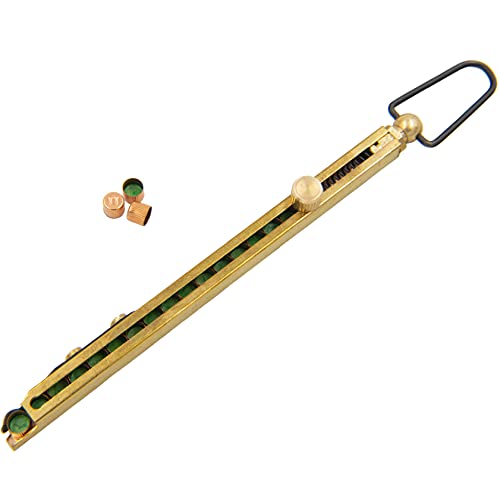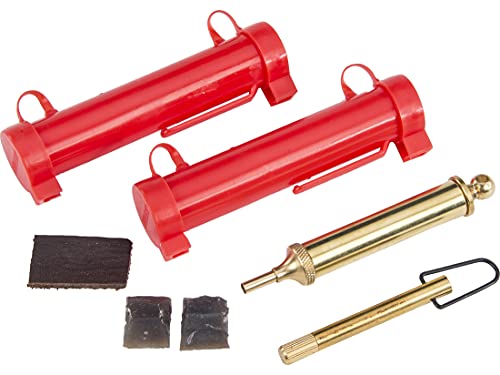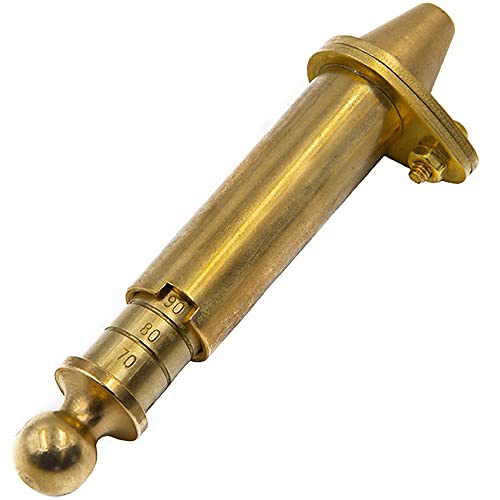I've been cooking a lot of ground beef lately. I usually pour it into a jar to keep it from going down the drain, and so I've been straining it through a coffee filter first thinking maybe it could be used as patch lube? I did some Googling and saw people talking about 'clarifying' it by boiling it in water, and letting it cool and skimming the grease off the top, but also saw some people saying that they wouldn't use it because of the salts from seasoning.
-
Friends, our 2nd Amendment rights are always under attack and the NRA has been a constant for decades in helping fight that fight.
We have partnered with the NRA to offer you a discount on membership and Muzzleloading Forum gets a small percentage too of each membership, so you are supporting both the NRA and us.
Use this link to sign up please; https://membership.nra.org/recruiters/join/XR045103
You are using an out of date browser. It may not display this or other websites correctly.
You should upgrade or use an alternative browser.
You should upgrade or use an alternative browser.
Can I use grease from cooking as patch lube?
- Thread starter SomeDude
- Start date

Help Support Muzzleloading Forum:
This site may earn a commission from merchant affiliate
links, including eBay, Amazon, and others.
CaptainKirk
54 Cal.
- Joined
- Feb 25, 2010
- Messages
- 2,243
- Reaction score
- 872
It will go rancid after a spell. From what I hear, mutton tallow is the only animal fat that doesn't. Check with your local butcher and/or meat market. Many times they will give it away.
- Joined
- Feb 13, 2020
- Messages
- 3,082
- Reaction score
- 6,919
It's not a question can you use it, all kinds of greasy stuff has been used but should you. Going rancid is a problem with fat based lube. I'd love a practical lube that smelled like bacon.
Jim Nasium
40 Cal
You certainly can. I wouldn't, unless it was the best option of what I had available. There are just too many other affordable options out there. I mean buy a bottle of the trashiest vegetable oil you can find, or lard, crisco, etc and you'll be better off.
The salt and/or acid argument is relatively irrational considering all the byproducts of blackpowder combustion in your barrel after firing anyway, but people like to come up with reasons why their lube is better than the next guys.
I'd probably use left over synthetic motor oil, or even Dino, long before I used cooked beef grease. I mean beef grease can get pretty nasty in a hurry. lol
After all, doesn't Ox-Yoke use mineral oil?
The salt and/or acid argument is relatively irrational considering all the byproducts of blackpowder combustion in your barrel after firing anyway, but people like to come up with reasons why their lube is better than the next guys.
I'd probably use left over synthetic motor oil, or even Dino, long before I used cooked beef grease. I mean beef grease can get pretty nasty in a hurry. lol
After all, doesn't Ox-Yoke use mineral oil?
The salt in cooking fat probably not good on a bore.
Jim Nasium
40 Cal
I wouldn't say the salt in cooking fat is any worse for the bore than shooting black powder is.
They both need to be cleaned out well.
They both need to be cleaned out well.

$44.99
$53.61
Traditions Performance Firearms Muzzleloader Flintlock Shooter’s Kit
Al's Sporting Goods

$15.99
Muzzle-Loaders Wooden Black Powder Muzzleloader Bullet and Sabot Starter - 6 Jags
IX Properties
When I was discharged from the Navy in 1967 I got very heavy into black powder and there was not a whole lot of things you could buy back then like there is today, Dixie Gun Works catalog was my only reference, so I made almost everything I could, and a can of Crisco was always my go-to lube
Back in the beginning , 1970 , Dixie gun works Old Zip patch grease, rendered mutton fat , was good for me. Don't think Dixie sells it anymore. Any grease should be used frugally , and be viscose and not hard.
- Joined
- Jan 6, 2021
- Messages
- 10,001
- Reaction score
- 3,960
That’s why I wondered about people using bear fat, since it seems like bear fat particularly goes rancid fast. But that’s just what I heard, I’ve never killed a bear.
- Joined
- Feb 13, 2020
- Messages
- 3,082
- Reaction score
- 6,919
Guess it doesn't have to smell goodThat’s why I wondered about people using bear fat, since it seems like bear fat particularly goes rancid fast. But that’s just what I heard, I’ve never killed a bear.
I would agree with the majority, in that you could try beef drippings for patch lube, but there may be better options. One thing I did not see addressed is that you have to get meat pretty hot to cook it, and the drippings may be rather scorched. This is the stuff that gets laquered onto your grill... sticky, tenacious, and brown. When properly rendered, tallow is pure white. When you render tallow, you only need to get it hot enough to melt the grease and separate it from the connective tissue, little blood vessels, and other materials that are in the fat.
I don't see why beef fat would not work. I'll need to double check to confirm this, but I believe J.R. Mead, the early Kansas pioneer, hunter, and trader, mentioned using buffalo tallow for greasing his rifles. He certainly rendered a lot of buffalo tallow for sale. Anyway, if you want to try beef tallow, I don't see any harm in it. I don't think there would be any salt in the fat of fresh beef. You can ask for fat from the butcher, and buy some cheesecloth while you are at the market. Put the fat in a heavy pot over medium heat. Stir it occasionally, and pour off the tallow as it melts, through a strainer lined with cheesecloth. Solids left in the pot after the fat renders out are called "cracklins" here in the south. These used to be a popular snack food at hog or beef killing time, but they will keep well in the freezer. Cracklings can also be mixed in with cornbread batter to make "cracklin cornbread," which I've eaten many times at my grandmother's house. Needless to say, your dog will like cracklings, too.
You can mix tallow with beeswax to stiffen it up. Proportions vary, and I don't have a recipe handy. I have rendered tallow, but haven't tried mixing it with beeswax.
I remember Old Zip Patch Grease! I still have two tins of it. One has been mostly used up, but the other is still sealed. Old Zip was a blend of mutton tallow and beeswax. I've used it as patch grease and on Minie bullets. I also use it to lubricate wood screws.
My only surviving old Dixie catalog (from 2011) still had Old Zip Patch Grease listed as item #LA0410, and stated "This is a mutton tallow/beeswax combination that can be stored in either patchbox or grease hole. Withstands high temperatures without melting. It is the formula used by the likes of A.O. "Pop" Neidner, Ned Roberts, and Walter M. Cline, and by the Marlin Firearms Co. and Massachussetts Arms Co. The French, Swiss, American, and British governments also used this grease to lubricate the bullets for their early black-powder cartridge military firearms. The primary use today is for greasing cloth patches."
I don't know, but suspect that Dixie discontinued Old Zip Patch Grease because of its name. "Old Zip Coon" was a character in minstrel shows, contemporary with Jim Crow. The name goes pretty far back. The naturalist, John Kirk Townsend, in Narrative of a Journey Across the Rocky Mountains, described his party making a pet of an antelope fawn, which they named "Zip Coon." This was in 1834, about the time when the song of that title was at the height of popularity. I can understand why Dixie would want to drop that name, as it would be offensive to many people. However, losing the product itself was unfortunate. As brother @oldwood said, it "was good for me."
Anyway, properly rendered tallow, whether beef, mutton, or buffalo, makes good patch lube. I would pass on hamburger drippings, though.
Notchy Bob
I don't see why beef fat would not work. I'll need to double check to confirm this, but I believe J.R. Mead, the early Kansas pioneer, hunter, and trader, mentioned using buffalo tallow for greasing his rifles. He certainly rendered a lot of buffalo tallow for sale. Anyway, if you want to try beef tallow, I don't see any harm in it. I don't think there would be any salt in the fat of fresh beef. You can ask for fat from the butcher, and buy some cheesecloth while you are at the market. Put the fat in a heavy pot over medium heat. Stir it occasionally, and pour off the tallow as it melts, through a strainer lined with cheesecloth. Solids left in the pot after the fat renders out are called "cracklins" here in the south. These used to be a popular snack food at hog or beef killing time, but they will keep well in the freezer. Cracklings can also be mixed in with cornbread batter to make "cracklin cornbread," which I've eaten many times at my grandmother's house. Needless to say, your dog will like cracklings, too.
You can mix tallow with beeswax to stiffen it up. Proportions vary, and I don't have a recipe handy. I have rendered tallow, but haven't tried mixing it with beeswax.
Back in the beginning , 1970 , Dixie gun works Old Zip patch grease, rendered mutton fat , was good for me. Don't think Dixie sells it anymore. Any grease should be used frugally , and be viscose and not hard.
I remember Old Zip Patch Grease! I still have two tins of it. One has been mostly used up, but the other is still sealed. Old Zip was a blend of mutton tallow and beeswax. I've used it as patch grease and on Minie bullets. I also use it to lubricate wood screws.
My only surviving old Dixie catalog (from 2011) still had Old Zip Patch Grease listed as item #LA0410, and stated "This is a mutton tallow/beeswax combination that can be stored in either patchbox or grease hole. Withstands high temperatures without melting. It is the formula used by the likes of A.O. "Pop" Neidner, Ned Roberts, and Walter M. Cline, and by the Marlin Firearms Co. and Massachussetts Arms Co. The French, Swiss, American, and British governments also used this grease to lubricate the bullets for their early black-powder cartridge military firearms. The primary use today is for greasing cloth patches."
I don't know, but suspect that Dixie discontinued Old Zip Patch Grease because of its name. "Old Zip Coon" was a character in minstrel shows, contemporary with Jim Crow. The name goes pretty far back. The naturalist, John Kirk Townsend, in Narrative of a Journey Across the Rocky Mountains, described his party making a pet of an antelope fawn, which they named "Zip Coon." This was in 1834, about the time when the song of that title was at the height of popularity. I can understand why Dixie would want to drop that name, as it would be offensive to many people. However, losing the product itself was unfortunate. As brother @oldwood said, it "was good for me."
Anyway, properly rendered tallow, whether beef, mutton, or buffalo, makes good patch lube. I would pass on hamburger drippings, though.
Notchy Bob
Last edited:
- Joined
- Apr 15, 2016
- Messages
- 3,515
- Reaction score
- 3,803
Spit patch. I never run out or go rancid.
- Joined
- Aug 6, 2005
- Messages
- 7,065
- Reaction score
- 5,355
Here in UK, which is temperate by the standards of the US - think Pacific North West - I make a mix of 70/30 bees' wax and Neats foot oil - but I've also tried olive oil with equal success. This is the concoction I use on Minié bullets year round - here we don't get to -20C and lower, or, even more worserer [for me] the +35C's.
It also works well on wood screws, and with Bore butter nearing $14 a tube, it's a lot cheaper.
It also works well on wood screws, and with Bore butter nearing $14 a tube, it's a lot cheaper.
- Joined
- Jan 31, 2009
- Messages
- 12,961
- Reaction score
- 7,199
I'm still using lanolin, olive oil and beeswax.


- Joined
- Jan 6, 2021
- Messages
- 10,001
- Reaction score
- 3,960
What’s a C? Just kidding, we are heading into the summer months right now in AZ. The average high is 35C. That’s about what it is today. In the hot part of the summer it will be regularly 40-45 and I have been in as high as 50.Here in UK, which is temperate by the standards of the US - think Pacific North West - I make a mix of 70/30 bees' wax and Neats foot oil - but I've also tried olive oil with equal success. This is the concoction I use on Minié bullets year round - here we don't get to -20C and lower, or, even more worserer [for me] the +35C's.
It also works well on wood screws, and with Bore butter nearing $14 a tube, it's a lot cheaper.
The difference between animal or vegetable oil/fats and mineral oils is that mineral oil only temporarily absorbs salts. Mineral oils can be made to carry acids but not salts.
So the salts from combustion of blackpowder is not held for long in a mineral oil based lubricant.
The Good Lord on the other hand made sure animal and vegetable fats can carry salts indefinitely so we could enhance our food and ofcourse shoot muzzloaders.
I have used beef fat mixed with olive oil and beeswax. Works great inside and out. On the lock parts too.
So the salts from combustion of blackpowder is not held for long in a mineral oil based lubricant.
The Good Lord on the other hand made sure animal and vegetable fats can carry salts indefinitely so we could enhance our food and ofcourse shoot muzzloaders.
I have used beef fat mixed with olive oil and beeswax. Works great inside and out. On the lock parts too.
I needed a lie down the other summer when it hit 36c at work!What’s a C? Just kidding, we are heading into the summer months right now in AZ. The average high is 35C. That’s about what it is today. In the hot part of the summer it will be regularly 40-45 and I have been in as high as 50.
ohio ramrod
75 Cal.
- Joined
- Aug 21, 2008
- Messages
- 7,473
- Reaction score
- 2,208
When using any animal fat I always boil some in water, let settle , and remove the fats, to allow the salts to go into the water. Fat-good , salt- bad.
I've been cooking a lot of ground beef lately. I usually pour it into a jar to keep it from going down the drain, and so I've been straining it through a coffee filter first thinking maybe it could be used as patch lube? I did some Googling and saw people talking about 'clarifying' it by boiling it in water, and letting it cool and skimming the grease off the top, but also saw some people saying that they wouldn't use it because of the salts from seasoning.
The folks are right that IF you have salt in it..., don't use it for patch lube or rust preventative or leather dressing. (See Below)
Historic note: the Sepoy Mutiny against the British in India began in part because of a rumor that the lubricated cartridges for the muzzle loading rifles used lard and tallow based grease as a lube..., the Muslims thought they were defiled because of the lard, and the Hindus thought they were defiled because the grease was an animal product.
The nice thing about tallow is the melting point is pretty high, and if you mix it with beeswax, say 2:1, you get a pretty good lube and leather dressing. BUT I think it's easier to use the bottom-of-the-line olive oil and beeswax in the same ratio as a lube. Neither formula will go rancid when the beeswax is there.
Instead use the beef tallow that you rendered for this recipe, but don't clarify it if you're using it for food :
"Dough Gods. – Take 2/3 of a cupful of flour, 1 teaspoonful of baking powder, ¼ teaspoon of salt, and a slice of fat bacon minced fine as possible. Mix thoroughly in your bread-pan and slowly add water, stirring and working till you have a fairly stiff dough. Flour the loaf top and bottom, flour your hands, and pat the dough out into a couple of big cakes about half an inch thick. Bake in the ashes, or in the frying pan…," Horace Kephart Camping and Woodcraft
- You can substitute an ounce of tallow for the bacon if all you have is tallow.
CaptainKirk
54 Cal.
- Joined
- Feb 25, 2010
- Messages
- 2,243
- Reaction score
- 872
I can understand why Dixie would want to drop that name, as it would be offensive to many people.
I'm surprised Dixie hasn't been shamed into changing the company name yet by the "woke folk"...
Similar threads
- Replies
- 249
- Views
- 23K


















